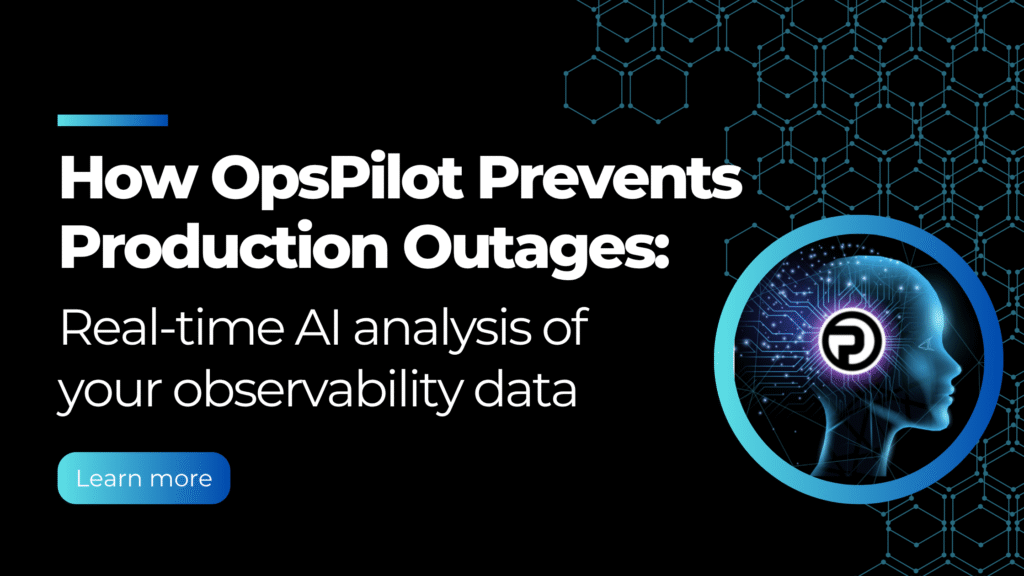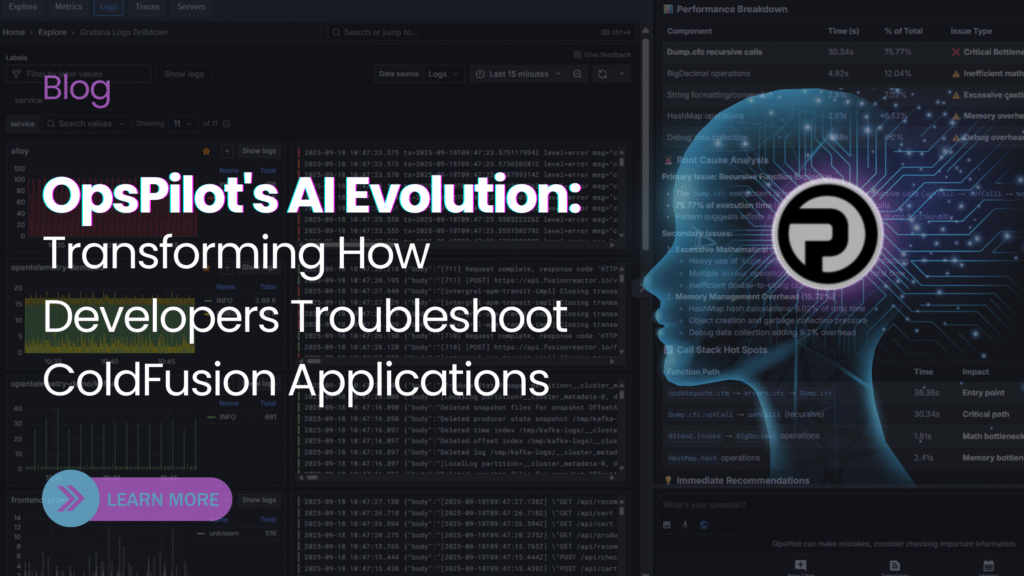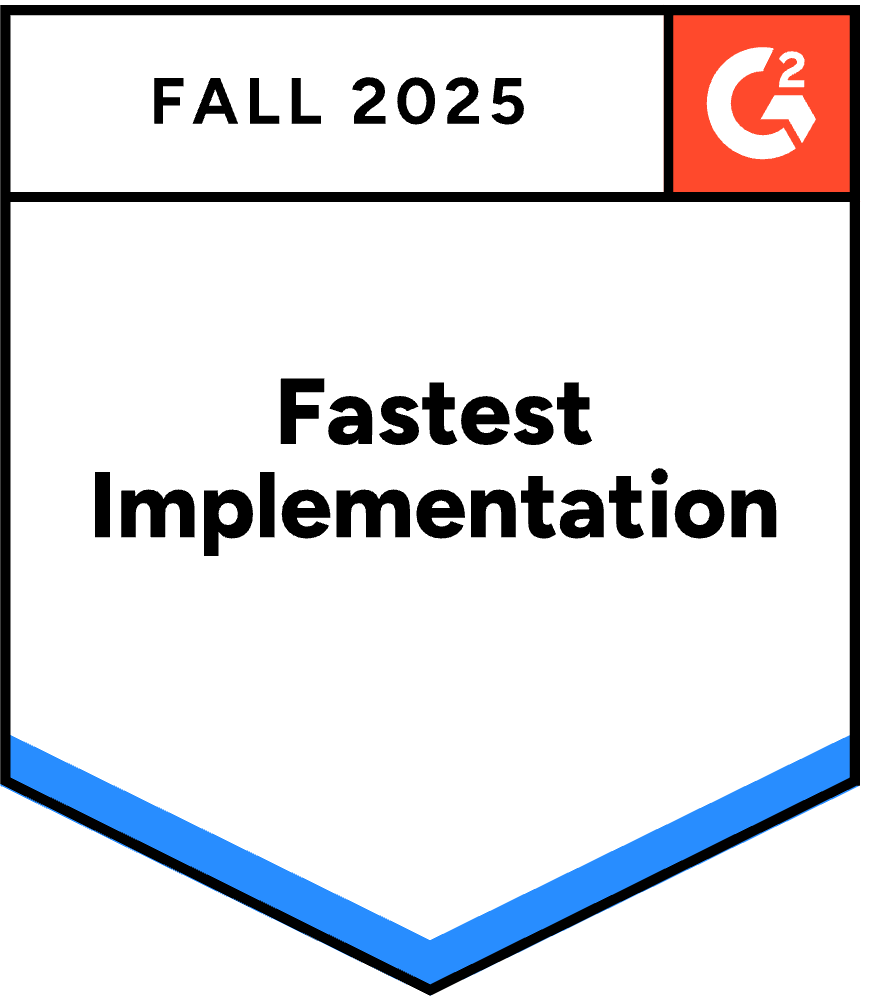Introduction: Why AI-Powered Code Review Matters for ColdFusion
Traditional code reviews catch syntax errors and style issues, but they often miss performance anti-patterns that only manifest under load. OpsPilot, FusionReactor’s AI-powered observability assistant, analyzes your running ColdFusion application to identify performance problems in your actual code patterns.
This guide demonstrates how OpsPilot identifies common ColdFusion anti-patterns, quantifies their impact, and provides specific fixes – all before your code reaches production.
1. N+1 Query Problem in CFLOOP
The Anti-Pattern:
<cfquery name="qUsers" datasource="#application.dsn#">
SELECT userId, userName FROM users WHERE active = 1
</cfquery>
<cfloop query="qUsers">
<cfquery name="qOrders">
SELECT * FROM orders
WHERE userId = <cfqueryparam value="#qUsers.userId#" cfsqltype="cf_sql_integer">
</cfquery>
<!--- Process orders --->
</cfloop>
OpsPilot Detection: When you ask “OpsPilot, why are my database queries taking so long?”, it identifies:
- 100 users = 101 database queries
- Average query time: 50ms × 101 = 5+ seconds total
- Database connection pool exhaustion risk
The Fix:
<cfquery name="qUserOrders" datasource="#application.dsn#">
SELECT u.userId, u.userName, o.*
FROM users u
LEFT JOIN orders o ON u.userId = o.userId
WHERE u.active = 1
ORDER BY u.userId
</cfquery>
2. Session Scope Memory Leaks
The Anti-Pattern:
<!--- In Application.cfc onSessionStart --->
<cffunction name="onSessionStart">
<cfset session.userCache = {}>
<cfset session.queryHistory = []>
</cffunction>
<!--- Throughout the application --->
<cfset session.queryHistory.append(duplicate(qLargeQuery))>
<cfset session.userCache[userId] = getUserData(userId)>
<!--- Never cleaned up --->OpsPilot Detection: Question: “OpsPilot, why is my ColdFusion application using so much memory?”
- Session scope growing by 12MB per hour
- 500 active sessions × 50MB each = 25GB heap usage
- OutOfMemoryError predicted in 4 hours
The Fix:
<!--- Implement session data limits --->
<cffunction name="addToSessionCache">
<cfargument name="key">
<cfargument name="value">
<!--- Limit cache size --->
<cfif structCount(session.userCache) GT 100>
<cfset structClear(session.userCache)>
</cfif>
<!--- Store only essential data --->
<cfset session.userCache[arguments.key] = {
id: arguments.value.id,
name: arguments.value.name,
timestamp: now()
}>
</cffunction>
3. Uncached Component Instantiation
The Anti-Pattern:
<!--- Creating new component instances on every request --->
<cffunction name="processOrder">
<cfset var emailService = createObject("component", "services.EmailService")>
<cfset var pdfGenerator = createObject("component", "utils.PDFGenerator")>
<cfset var validator = createObject("component", "utils.OrderValidator")>
<!--- Use components --->
</cffunction>
OpsPilot Detection: “OpsPilot, why are there 1,200 instances of EmailService.cfc in memory?”
- Component instantiation: 500ms per request
- Memory usage: 1,200 instances × 2MB = 2.4GB
- Garbage collection pressure causing 11-minute pauses
The Fix:
4. Query of Queries Performance Issues
The Anti-Pattern:
<cfquery name="qAllProducts" datasource="#application.dsn#">
SELECT * FROM products
</cfquery>
<!--- Multiple QoQ operations --->
<cfquery dbtype="query" name="qActive">
SELECT * FROM qAllProducts WHERE status = 'active'
</cfquery>
<cfquery dbtype="query" name="qExpensive">
SELECT * FROM qActive WHERE price > 100
</cfquery>
OpsPilot Detection:
- Query of Queries 50x slower than database queries
- Loading entire table into memory
- CPU spike to 40% during QoQ operations
The Fix:
<!--- Single optimized database query --->
<cfquery name="qProducts" datasource="#application.dsn#">
SELECT * FROM products
WHERE status = 'active'
AND price > 100
ORDER BY price DESC
</cfquery>
5. Missing Database Indexes
The Anti-Pattern:
<cfquery name="qSearch" datasource="#application.dsn#">
SELECT * FROM products
WHERE LOWER(description) LIKE <cfqueryparam value="%#lcase(searchTerm)#%" cfsqltype="cf_sql_varchar">
AND category = <cfqueryparam value="#category#" cfsqltype="cf_sql_varchar">
AND price BETWEEN #minPrice# AND #maxPrice#
</cfquery>
OpsPilot Detection: “OpsPilot, which queries are getting progressively slower?”
- Query response time: 200ms → 8,542ms over 2 weeks
- 30,000+ timeout errors
- Full table scan on million-row table
The Fix:
-- Add composite index
CREATE INDEX idx_products_search
ON products(category, price, description);
-- Or use full-text search
ALTER TABLE products ADD FULLTEXT(description);How to Use OpsPilot for Pre-Production Code Review
Daily Development Questions
Morning Standup:
- “OpsPilot, did my recent code changes introduce any performance issues?”
- “OpsPilot, are there any new memory allocation patterns?”
Before Commit:
- “OpsPilot, how do the staging metrics compare to production?”
- “OpsPilot, are there any slow queries in my new code?”
Before Deploy:
- “OpsPilot, what’s the resource impact of my changes?”
- “OpsPilot, are there any error patterns in staging?”
Continuous Integration Pipeline Integration
# .gitlab-ci.yml or similar
performance_check:
script:
- deploy_to_staging
- sleep 300 # Let it run for 5 minutes
- |
opspilot_check="$(ask_opspilot 'Are there any performance issues in staging?')"
if [[ $opspilot_check == *"CRITICAL"* ]]; then
exit 1
fiReal-World Impact: Before and After OpsPilot Code Review
Case Study: E-Commerce Platform
Before OpsPilot Review:
- 40% CPU usage (quote service)
- 30-second database timeouts
- 3 OutOfMemoryErrors per week
- 11-hour garbage collection pauses
After Implementing OpsPilot’s Recommendations:
- 4% CPU usage (90% reduction)
- 200ms average query time
- Zero memory errors in 3 months
- 200ms max GC pause
Quantified Benefits
| Metric | Before | After | Improvement |
|---|---|---|---|
| Response Time | 8.5 seconds | 450ms | 95% faster |
| Memory Usage | 25GB | 4GB | 84% reduction |
| Error Rate | 19/hour | 0.5/hour | 97% reduction |
| Infrastructure Cost | $3,500/month | $750/month | 79% savings |
OpsPilot vs Traditional Code Review Tools
Traditional Static Analysis
- Catches syntax errors
- Enforces style guides
- Identifies potential bugs
- Missing: Runtime performance impact
OpsPilot Dynamic Analysis
- Identifies actual performance bottlenecks
- Quantifies resource consumption
- Detects memory leaks in production patterns
- Provides specific, actionable fixes
Implementation Guide: Setting Up OpsPilot Code Review
Step 1: Enable FusionReactor in Development
<!--- In Application.cfc for dev environment --->
<cfif application.environment EQ "development">
<cfset javaagent = "-javaagent:/path/to/fusionreactor.jar">
</cfif>
Step 2: Create Code Review Checklist
opspilot_code_review:
performance:
- "Are there any N+1 query patterns?"
- "Is memory usage stable after my changes?"
database:
- "Which queries take longer than 1 second?"
- "Are there missing indexes?"
resources:
- "What's the CPU impact of my code?"
- "Are there any memory leaks?"Step 3: Establish Performance Baselines
- Baseline response times
- Normal memory usage patterns
- Acceptable error rates
- Resource consumption targets
Frequently Asked Questions
Q: How long should code run before OpsPilot review? A: 5-10 minutes of typical usage provides enough data for analysis.
Q: Can OpsPilot review code that hasn’t run yet? A: OpsPilot analyzes runtime behavior. Deploy to staging first for review.
Q: What if OpsPilot finds issues in production code? A: OpsPilot can analyze production patterns to prioritize technical debt fixes.
Q: How does OpsPilot compare to traditional APM tools? A: OpsPilot provides AI-powered analysis and specific code-level recommendations, not just metrics.
Conclusion: Prevent Performance Issues Before Production
OpsPilot transforms code review from a subjective process to a data-driven practice. By analyzing actual runtime behavior, OpsPilot catches performance anti-patterns that traditional reviews miss:
- N+1 queries that seem fine in development but fail under load
- Memory leaks that only manifest after hours of runtime
- Database queries that degrade as tables grow
- Component instantiation patterns causing garbage collection issues
The result? 95% faster response times, 84% less memory usage, and 79% infrastructure cost savings – all by catching issues before they reach production.
Stop deploying performance problems. Let OpsPilot review your ColdFusion code’s actual behavior, not just its syntax.
Ready to revolutionize your code review process? Start your free FusionReactor trial and let OpsPilot analyze your ColdFusion application today.
















